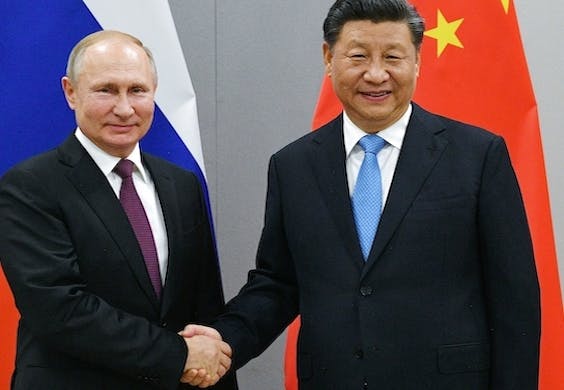Communist China’s Choice
China’s decision to trim its sails on financial secrecy in order to keep its corporations listed on American stock exchanges is a sign of engagement with the West — and a case of incremental progress.

One question in respect of Ukraine will be which side Communist China ultimately chooses: Russia or the West. Does China’s concession on Saturday, say, to America over its financial secrecy laws give a hint of its plans? Russia and China had pledged friendship with “no limits” as a “decoupling” with America waxed. Since then, the Middle Kingdom has taken a middle path, neither condemning nor endorsing the war.
Just last week, China’s strategic ambiguity was on display at the “virtual summit” between Beijing and the European Union. President Xi deflected questions over whether his country supported President Putin’s invasion. China also blamed America and NATO for causing the conflict. Yet China’s assistance to Russia has so far been confined to moral support, as the Financial Times reports, in part to avoid economic fallout.
China’s hesitation is best understood from the economic vantage point. As much as Mr. Xi might share Mr. Putin’s authoritarian and expansionist worldview, there are substantial material reasons linking China with the West. The value of China’s trade with Russia last year was a little short of $150 billion. That’s just under a tenth of its American and European Union trade, which ran to $1.6 trillion.
The scale of China’s trade with the West is doubtless a factor in the move announced by Beijing on Saturday to revise its audit secrecy laws. The change came in response to an American law, enacted in 2020 as the “Holding Foreign Companies Accountable Act.” It requires overseas companies to subject themselves to American audits to be listed on stock exchanges here. More than 200 Chinese concerns risked being delisted.
We don’t want to make too much of China’s agreement to cooperate with America on this head. Yet Bloomberg News says it signals that China is “not at all prepared to abandon the dollar-dominated global financial system.” The Financial Times calls it “the first big rule change by China to allow disclosure of financial information outside the country.” China hails the change as a sign of “cross-border regulatory cooperation.”
The policy change “could open the door to inspections by U.S. regulators,” Reuters says, giving them “complete access” to “firms’ audit working papers” stored in China. Then again, too, the chairman of the Securities and Exchange Commission, Gary Gensler, cautions that China will need to fully comply with the American law to keep its companies listed. The fine print of Communist China’s legal revision has yet to be seen.
In any event, this pledge of financial transparency bodes well for the kind of liberalization that advocates of bringing Communist China into the global trade system envisioned some two decades ago. By joining the World Trade Organization, President Clinton contended in 2000, “China is not simply agreeing to import more of our products, it is agreeing to import one of democracy’s most cherished values, economic freedom.”
The optimism of Mr. Clinton, among many others, was to prove misplaced as far as Beijing embracing Western-style political liberalism — even as China’s economy soared after it hitched its wagon to the global economy. Yet China’s decision to trim its sails on financial secrecy in order to keep its corporations listed on American stock exchanges is a sign of engagement with the West — and a case of incremental progress.
Contrast China’s engagement with Russia’s moves toward economic isolation. The Biden administration warns Russia is moving toward “autarky,” according to Politico, as the country “is becoming isolated to the point where it will eventually only be able to consume what’s made within its borders.” That’s a reversion to Stalin’s era, a time when Mr. Putin says Russia “developed and made colossal achievements” despite isolation.
More ominously, as the Sun’s Aleksandra Gadzala Tirziu reports, Russia is contemplating a strategy in which “food is our weapon” as its erstwhile president, Dmitry Medvedev, warned Friday. Such talk of weaponizing trade — and even threatening famine — can only serve as a reminder to Mr. Xi that no matter how tempting it might be for Beijing to cast its lot with Moscow, China’s economic interests lie with the West.

